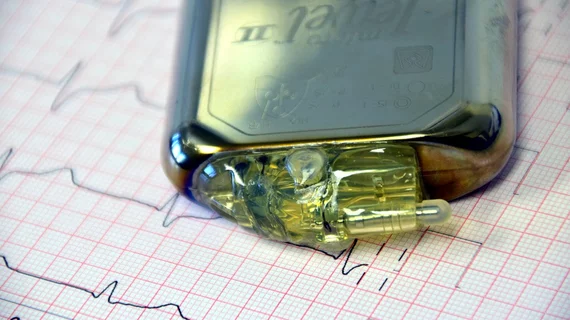The odds a heart patient will experience complications after they’re implanted with a cardiac device vary depending on where they receive care, according to work published in the Annals of Internal Medicine July 30.
The study, led by the University of Adelaide’s Isuru Ranasinghe, PhD, involved analyzing the quality of care after cardiovascular implantable electronic device (CIED) insertion across 174 hospitals in Australia and New Zealand. Last year alone, Australian cardiologists implanted more than 4,000 defibrillators and nearly 19,000 pacemakers.
Ranasinghe et al.’s study population comprised 81,304 patients who had recently received a new CIED, including 65,711 permanent pacemakers (PPMs) and 15,593 implantable cardioverter-defibrillators (ICDs). Of that group, 6,664 patients—8.2% of the total—experienced a major complication.
Complication rates were higher for ICDs than for PPMs, the authors said, with complication rates of 10.04% versus 7.76%. More than three-quarters of all complications were attributable to PPMs; just 1,566 complications stemmed from ICDs.
Among hospitals that implanted at least 25 CIEDs, the median risk-standardized complication rates (RSCRs) varied from 5.3% to 14.3%. Twenty-two hospitals had RSCRs that differed significantly from the national average of 8.1%.
Ranasinghe and colleagues found similar variation when considering RSCRs for PPM implantations apart from RSCRs for ICD placements, noting the average RSCR in PPM cases was 7.6% (range, 5.4% to 12.9%) and the average RSCR in ICD cases was 9.7% (range, 6.2% to 16.9%).
“Complications experienced by patients vary between twofold and threefold among hospitals, which suggests that there is significant variation in CIED care quality,” Ranasinghe said in a release. “Serious complications can cause considerable patient harm and adds to avoidable healthcare costs. About 60% of these complications occur after leaving the hospital, so many doctors and hospitals may not be fully aware of the complications experienced by patients.”
In the journal, the authors said their study reveals something important—that hospital staff should be routinely reporting complication rates in an effort to foster greater transparency among clinicians, hospitals and their larger communities.
“Encouraging hospitals to take part in quality improvement activities such as auditing complications and engaging in clinical quality registries also reduce complications over time,” Ranasinghe said.

